Abstract
By the use of the thrombocyte consumption test (T.C.T.) autoantibodies reacting with heart muscle tissue have been demonstrated in 63·3% of the cases of coronary heart disease accompanied by different grades of insufficiency of the blood supply to the heart muscle. These autoantibodies could be detected two to three weeks after the onset in most patients experiencing a coronary attack for the first time, and persisted for about three to eight weeks following single attacks, whereas following recurrence in patients affected for several months or years the autoantibodies appeared in the serum most frequently within one week, and when the painful attacks were repeated, the T.C.T. remained positive for months, with only short interruptions.
In cases of acute myocardial infarction the finding of a positive T.C.T. and its duration did not depend on the severity of the clinical symptoms nor on the measure of the laboratory changes but positive results were obtained more frequently in patients with acute coronary insufficiency (intermediate coronary syndrome) or angina pectoris with intense pain and frequent attacks than in patients in whom the attacks were infrequent producing slight symptoms.
There was no evidence that these autoantibodies had any damaging effect.
Full text
PDF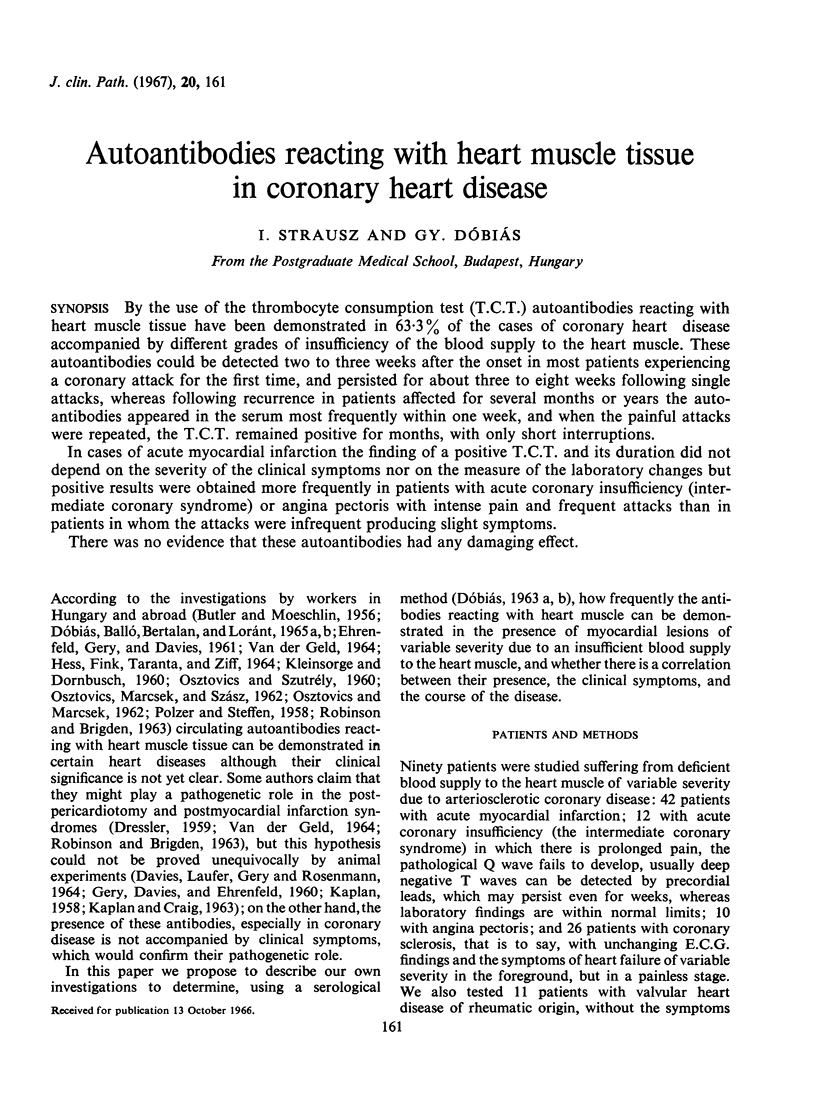
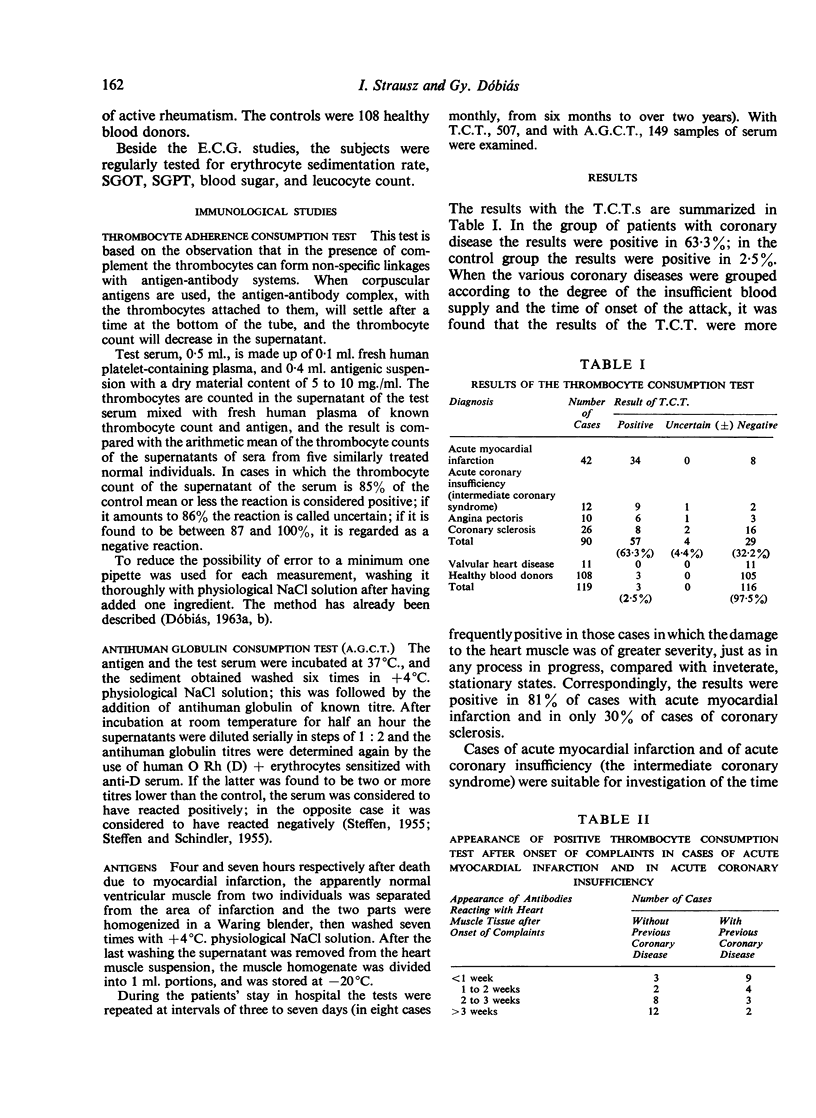
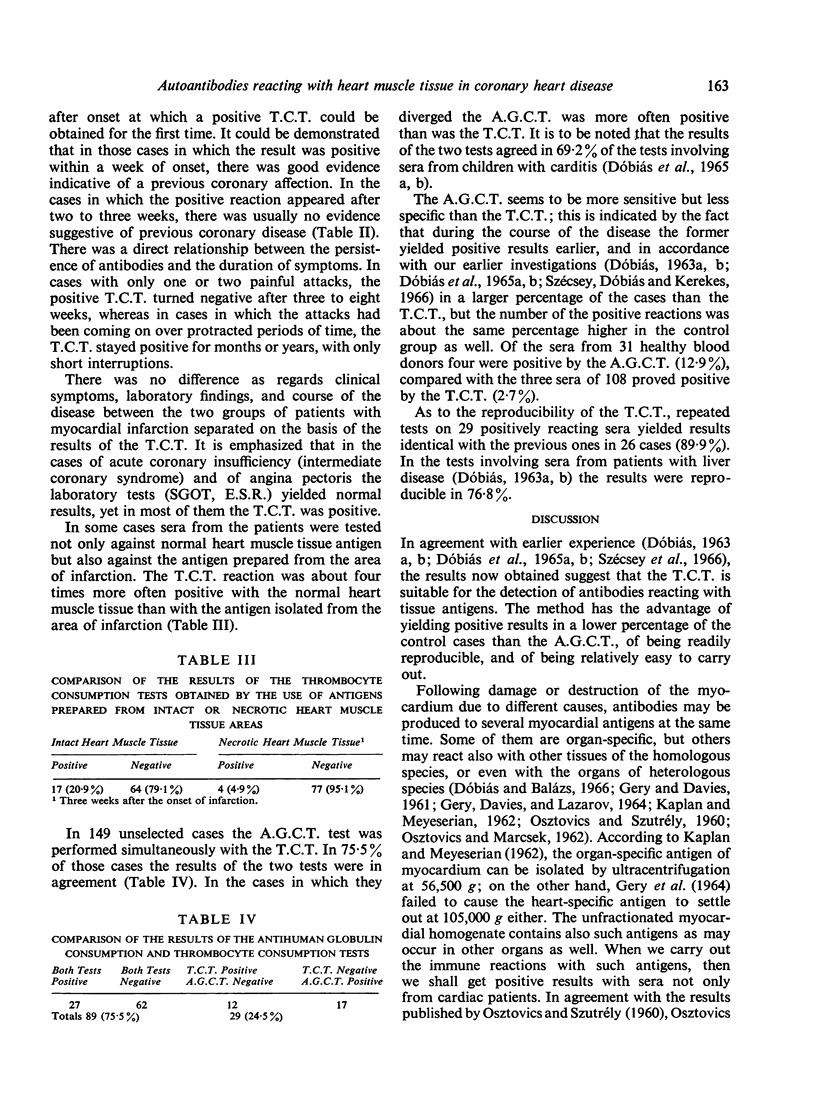
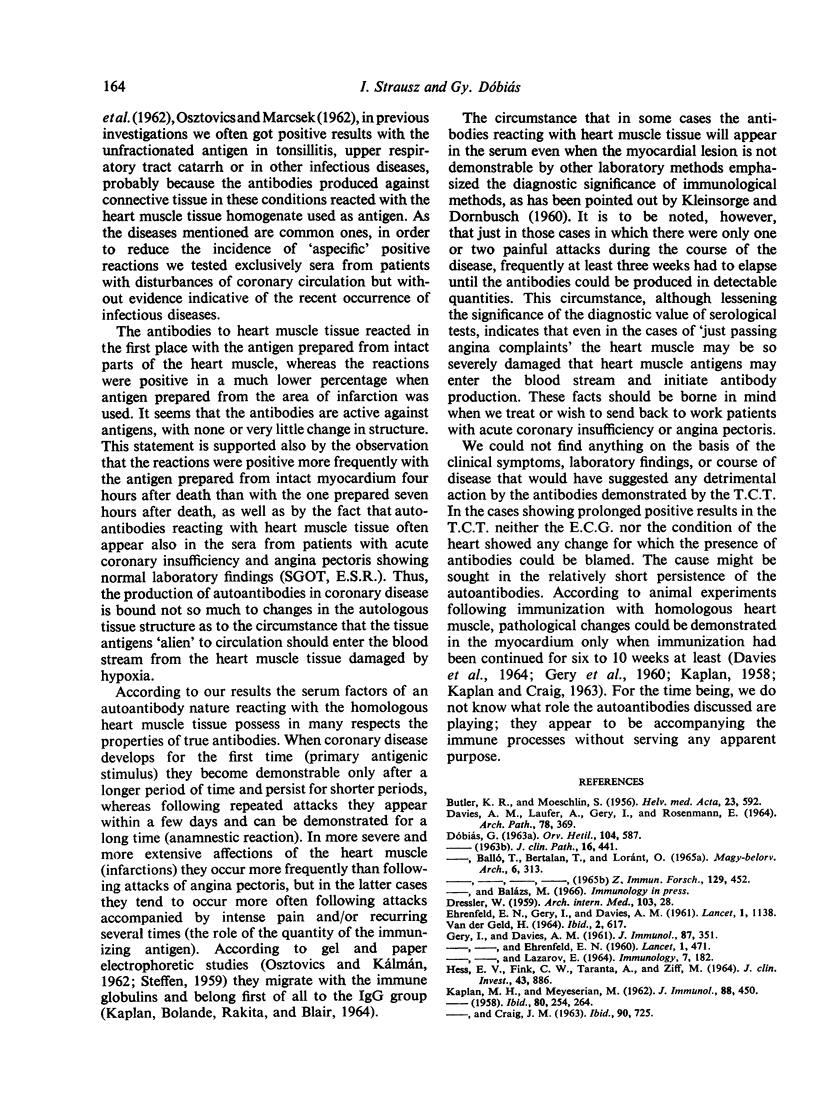
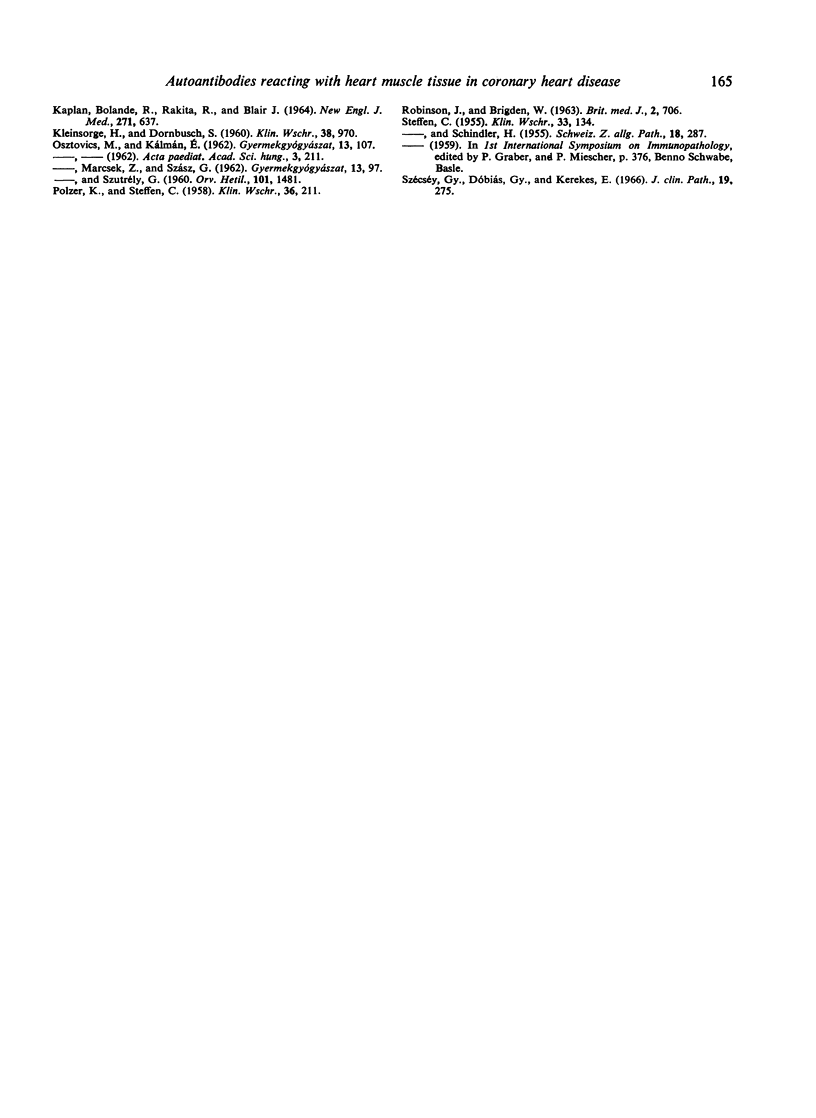
Selected References
These references are in PubMed. This may not be the complete list of references from this article.
- BUTLER K. R., MOESCHLIN S. Antikörper gegen verschiedene Gewebszellen bei rheumatischen und anderen Erkrankungen. Helv Med Acta. 1956 Nov;23(4-5):592–596. [PubMed] [Google Scholar]
- DAVIES A. M., LAUFER A., GERY I., ROSENMANN E. ORGAN SPECIFICITY OF THE HEART. 3. CIRCULATING ANTIBODIES AND IMMUNOPATHOLOGICAL LESIONS IN EXPERIMENTAL ANIMALS. Arch Pathol. 1964 Oct;78:369–376. [PubMed] [Google Scholar]
- DOBIAS G. [A simple method for the demonstration of serum factors of autoantibody nature (thrombocyte consumption test)]. Orv Hetil. 1963 Mar 31;104:587–590. [PubMed] [Google Scholar]
- DRESSLER W. The post-myocardial-infarction syndrome: a report on forty-four cases. AMA Arch Intern Med. 1959 Jan;103(1):28–42. doi: 10.1001/archinte.1959.00270010034006. [DOI] [PubMed] [Google Scholar]
- Ehrenfeld E. N., Gery I., Davies A. M. Specific antibodies in heart-disease. Lancet. 1961 May 27;1(7187):1138–1141. doi: 10.1016/s0140-6736(61)92066-9. [DOI] [PubMed] [Google Scholar]
- GERY I., DAVIES A. M., LAZAROV E. IMMUNITY AND IMMUNOTOLERANCE TO BOVINE HEART ANTIGENS IN THE RAT. Immunology. 1964 Mar;7:182–192. [PMC free article] [PubMed] [Google Scholar]
- GERY I., DAVIES A. M. Organ specificity of the heart. I. Animal immunization with heterologous heart. J Immunol. 1961 Oct;87:351–356. [PubMed] [Google Scholar]
- HESS E. V., FINK C. W., TARANTA A., ZIFF M. HEART MUSCLE ANTIBODIES IN RHEUMATIC FEVER AND OTHER DISEASES. J Clin Invest. 1964 May;43:886–893. doi: 10.1172/JCI104974. [DOI] [PMC free article] [PubMed] [Google Scholar]
- KAPLAN M. H., BOLANDE R., RAKITA L., BLAIR J. PRESENCE OF BOUND IMMUNOGLOBULINS AND COMPLEMENT IN THE MYOCARDIUM IN ACUTE RHEUMATIC FEVER. ASSOCIATION WITH CARDIAC FAILURE. N Engl J Med. 1964 Sep 24;271:637–645. doi: 10.1056/NEJM196409242711301. [DOI] [PubMed] [Google Scholar]
- KAPLAN M. H., CRAIG J. M. IMMUNOLOGIC STUDIES OF HEART TISSUE. VI. CARDIAC LESIONS IN RABBITS ASSOCIATED WITH AUTOANTIBODIES TO HEART INDUCED BY IMMUNIZATION WITH HETEROLOGOUS HEART. J Immunol. 1963 May;90:725–733. [PubMed] [Google Scholar]
- KAPLAN M. H., MEYESERIAN M. Immunologic studies of heart tissue. V. Antigens related to heart tissue revealed by cross-reaction of rabbit antisera to heterologous heart. J Immunol. 1962 Apr;88:450–461. [PubMed] [Google Scholar]
- KLEINSORGE H., DORNBUSCH S. [On the presence of a serum factor with auto-antibody features in heart infarct]. Klin Wochenschr. 1960 Oct 1;38:970–973. doi: 10.1007/BF01484306. [DOI] [PubMed] [Google Scholar]
- OSZTOVICS M., MARCSEK Z. [Correlations between the clinical condition and the antiglobulin consumption test in rheumatic fever in childhood]. Acta Paediatr Acad Sci Hung. 1962;3:211–224. [PubMed] [Google Scholar]
- POLZER K., STEFFEN C. Weitere Untersuchungen über die klinische Verwertbarkeit des Antiglobulin-Konsumptionstestes bei rheumatischen Herzerkrankungen und Vergleich der Konsumptionsergebnisse mit den Resultaten anderer Laboratoriumsmethoden. Klin Wochenschr. 1958 Mar 1;36(5):211–218. doi: 10.1007/BF01480161. [DOI] [PubMed] [Google Scholar]
- VAN DER GELD H. ANTI-HEART ANTIBODIES IN THE POSTPERICARDIOTOMY AND THE POSTMYOCARDIAL-INFARCTION SYNDROMES. Lancet. 1964 Sep 19;2(7360):617–621. doi: 10.1016/s0140-6736(64)90512-4. [DOI] [PubMed] [Google Scholar]


